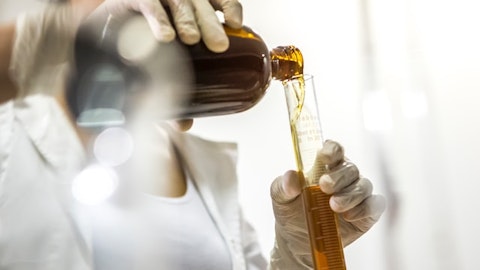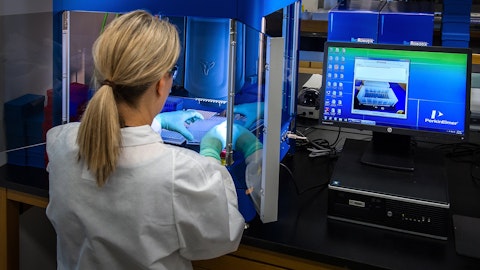Phil Nadeau: Great. And then one last question from us. In terms of German reimbursement, can you remind us where you are in negotiating the final price for IMCIVREE and BBS in Germany? Thanks.
David Meeker : Yes. Yann?
Yann Mazabraud: Yes. Thank you. So, we are still in the midst of the POMC cost pricing negotiation and so far, the dialogue has been very positive. To date, the medical benefit assessment has been positive as well. BBS price negotiation will start in a few months and the process takes approximately 6 to 9 months. So, more to come for the German price for BBS.
Phil Nadeau: Perfect. Thanks again for taking our questions.
Operator: Thank you. Alright. One moment, please for the next question. Alright. Our next question comes from the line of Derek Archila from Wells Fargo. Please go ahead.
Derek Archila: Hey, good morning everyone and congrats on the progress. Thanks for taking the questions here. Just a couple from us. So, I know you said that the BBS launch and these types of rare disease launches can be lumpy, but I guess can you provide some more color on what’s specifically driving the acceleration that we saw in new patient adds from 4Q to 1Q here? And is that something that’s going to translate going forward to the following quarters? And then second question is, do we have enough data yet to really understand the discontinuation rate for IMCIVREE in Bardet-Biedl patients in real clinical practice and just understanding how that’s trending right now? And I might have one follow-up. Thanks.
David Meeker: Thanks, Derek. Jennifer?
Jennifer Chien: Sure. I would say that overall, just in terms of the level of demand and interest for this specific therapy for BBS has been really overwhelming and great to see, as well as clearly, there was a need in the patient population as we’re hearing the benefit that the patients are actually receiving. Once again, a motivating factor for our teams overall. There were existing opportunities that still remain in terms of the patients that were identified through all of our cross functional team efforts and still remaining opportunity just in terms of pull-through to scripts. And in the meantime, I could feel that in any disease, but particularly in this one, we have identified specific ways of going about to really have targeted approaches of patient find an identification.
One, to get to physicians or patients that have already been diagnosed and lost in the system, as well as trying to expedite the path to get patients who are symptomatic to a diagnosis. So, all of these efforts are ongoing, which continue to fuel the increase just in terms of number of scripts that we have received. When we say that rare diseases are critical, I would say that in terms of some of these efforts, you know, you can’t predict quarter-by-quarter that’s going to be the exact same, you know. So, I wouldn’t necessarily linearize or just make the same assumptions quarter-over-quarter at point of time, but I would just say that there still remains quite an opportunity just in terms of growth within this patient population for IMCIVREE.
To the next question, I think around…
David Meeker: May just add one quick follow-on to that, Derek. So, I think what we can say at this point and just what Jennifer said is that we are well beyond whatever pent-up demand existed in the system and the like and that you’re seeing now a quarter-on-quarter as we would expect stability and, sort of ongoing strength in the overall opportunity, if you will. And again, I’ll reference back to the number of physicians who we had not been in contact with who in that pool is growing. And that’s again what we would see and speaks to overall health of, I think a rare disease opportunity, but again, don’t trend as Jennifer said. I think that’s not. It could be less or more in any given quarter, but our confidence that this thing is real and working is very high.





